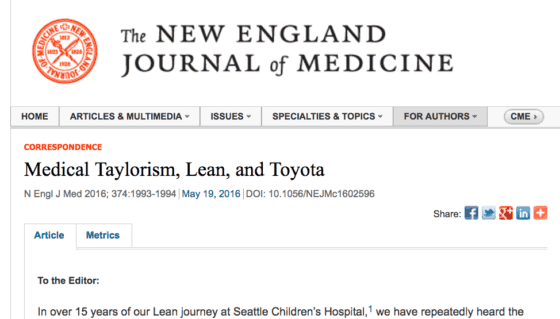
You might remember the hubbub (and my earlier blog post) about this article that somehow appeared in the NEJM: “Medical Taylorism.”
It's sad and frustrating that people so often talk past each other in these different “debates” about Lean. Drs. Groopman and Hartzband seem unwilling to learn about Lean and TPS. They have just now doubled down on their assertion that Lean equals Taylorism and that it's not appropriate for healthcare. Sigh.
The NEJM just published two letters to the editor.

The first letter is from two physicians at Seattle Children's Hospital:
They wrote, in part:
“Work harder and faster” is the usual response [to the idea of Lean] by the uninvolved, uninitiated observers.
They point out, correctly, that Lean isn't about telling doctors how to do their work… it's about engaging everybody in improvement and treating them with respect.
Instead of top-down Neo-Taylorism, Lean is actually:
“[an] engaged, bottom-up approach of standardizing processes allows each provider to deliver his or her best possible care for every patient.”
The second letter debunking “Medical Taylorism” comes from three people from the Rona Consulting Group, who has roots in the successful Lean work at Virginia Mason Medical Center. One of the writers is a physician, the other is Tom Jackson (a top Lean author who has roots in manufacturing), the other is Joanna Omi who, until recently, led the Lean efforts in the NYC public hospital system.
Their letter starts:
“Hartzband and Groopman distort Lean management and incorrectly conflate Taylorism with the TPS. This is disappointing and unfortunate.”
They add:
“Improvements are made by people who do the work, not by “efficiency experts.” Lean standard work does not replace the art of medicine. It serves to reduce unnecessary variation in repetitive processes — not to standardize necessary variation in individualized patient care. Using the scientific method, Lean results in predictability and a path to meet patient needs without overburdening clinicians and staff.”
That's what Lean is supposed to be.
In their response, Groopman and Hartzband basically just repeat what they said before.
They say first:
“The TPS is a set of principles designed for the manufacture of inanimate objects in a factory.”
That's completely incorrect and shows a lack of willingness to learn on their part, if they received any direct feedback after their original piece.
If TPS is only about manufacturing inanimate objects, why does Toyota so successfully use these same principles and methods to help eye clinics and food banks do a better job of serving people? See these great videos:
I guess Toyota doesn't understand their own production system, if you believe the good doctors.
The doctors say:
“We accurately depict two essential elements of this system that are directly derived from Taylorism: standardization and time efficiency.”
Except they did NOT accurately depict standardized work, as the letter writers (and I) point out. The doctors also presented an INCOMPLETE view of TPS, thereby making it inaccurate.
They also say:
“In his classic study of the application of Toyota principles to the manufacture of cars in the United States, Paul Adler describes how “Each job was analyzed down to its constituent gestures, and the sequence of movements was refined and optimized for maximum performance. Every task was planned in great detail, and each worker was expected to perform that task in the prescribed manner.”1“
I have never heard of this “classic” study, nor have I heard of Adler. If the doctors mean this article by Adler, it's from 1993. The article was contributed to a book titled Lean Work: Empowerment and Exploitation in the Global Auto Industry, which examines “the controversial Japanese model of “lean production” and its impact on work and workers.” It looks and sounds like the type of leftist academic criticism of Lean that assumes that anything proposed by management is somehow a way of better exploiting workers, even if it sounds good.
Hear Mark read this post — subscribe to Lean Blog Audio
Update: I read the Adler article, and it's quite positive about Lean and TPS. Ironically, the Adler article DISPROVES the Groopman and Hartzband thesis that Lean = Taylorism. The Adler article clearly spells out the differences between the old GM approach (Taylorism) and Lean.
Back to their quote… just because Toyota and NUMMI analyzed each job down to its most minute gestures (and that's the norm in the auto industry, with Lean thinking or otherwise), it doesn't mean we do exactly that in a less repetitive environment like healthcare. Again, see the Toyota videos above.
The authors refuse to learn that Lean and Toyota-ism came FROM Taylorism, but it's NOT Taylorism. I could say that Drs. Groopman and Hartzband put leeches on patients… I mean, doctors USED to do that and modern medicine evolved from old barber methods. I can see the difference between modern medicine and old methods. Why are the doctors ignorant about the differences between old Taylorism and modern Lean?
The doctors are sorta getting at something where when they say:
“In the above letters, despite claims of science, we are struck by highly subjective terms used by Lean consultants including “unnecessary variation,””best possible care,”and eliminating “complexity.” In much of patient care, there is no standard regarding what is “best.” As opposed to a factory assembly line, medicine necessarily involves considerable complexity and uncertainty.”
Yes, there IS complexity and uncertainty. And that's why Lean healthcare is NOT top-down Taylorism with inappropriate standardization. The doctors are arguing against a straw man that they created.
It's ironic that they decry the lack of science in the words of the letter writers, but they don't clearly define phrases like “considerable complexity and uncertainty” either.
It's also a shame that they don't understand or respect the fact that there IS a lot of complexity and uncertainty in most types of manufacturing.
They do make a good point here:
“The patient's “condition” will never be the only variable in the system, nor should it be, because both patients and medical professionals are people — individuals with diverse goals, preferences, and personal styles that matter.”
I agree that we shouldn't (and can't) force everybody to do everything the same way. For one, Lean isn't about forcing people to work a certain way.
I do hope, however, that the doctors aren't saying that it's OK for “preferences and personal styles” to trump what's right for the patient and their outcomes.
“Other medical professionals who, like us, have experienced the toxic effects of obsessive standardization and time efficiency in the care of patients have expressed concerns similar to ours.”
Many of us have speculated if the doctors had a bad experience with Lean or if they had just read about them or heard about them. Their letter response seems to imply they've had a “toxic” experience of their own. If they have, they shouldn't confuse what happened to them with what Lean is supposed to be. I've agreed with them in earlier posts that “obsessive standardization” is not the goal of Lean.
The doctors have valid complaints – their error is making broad generalizations about what Lean is.
The doctors finish:
“In an era of accountability, we believe that those who advocate the application of Lean principles to medical care must take responsibility for the unintended consequences resulting from these elements shared by Taylorism and Toyota practices.”
I guess it makes sense for me (or John Shook or John Toussaint, MD or others) to “take responsibility” for others who misunderstand Lean or those who do bad things in the name of Lean… it makes sense if Drs. Groopman and Hartzband also take responsibility for every other doctor's malpractice cases.
The doctors don't understand “Lean,” and they don't understand “responsibility.”
Related reading:
Time & Motion Studies Are Not “Discredited,” Just How They Are Used
Malpractice in the New England Journal of Medicine (Shook)
The Toyota Production System: What Does It Mean, And What Does It Mean For Health Care? (Toussaint, et al)
Doctors Bash “Taylorism” and “Toyota Lean” in the New England Journal of Medicine
Please scroll down (or click) to post a comment. Connect with me on LinkedIn.
Let’s work together to build a culture of continuous improvement and psychological safety. If you're a leader looking to create lasting change—not just projects—I help organizations:
- Engage people at all levels in sustainable improvement
- Shift from fear of mistakes to learning from them
- Apply Lean thinking in practical, people-centered ways
Interested in coaching or a keynote talk? Let’s start a conversation.








![What’s Your Organization’s Real Mistake Policy? [Poll]](https://www.leanblog.org/wp-content/uploads/2025/07/Lean-Blog-Post-Cover-Image-2025-07-17T085114.134-100x75.jpg)

It’s ridiculous to take responsibility for the unintended consequences resulting from Lean in healthcare. But it is wise to formally analyse Lean unintended consequences and Lean failures to support learning and improvement.
Agreed, Bob. And thanks for the work you do challenging others and supporting learning and improvement.
I’m reading the Adler paper. Haven’t read the whole thing yet to see what’s “controversial” about Lean, but this mention of Kaizen makes it clear that TPS isn’t top-down Taylorism:
The article also talks about teams instead of traditional management control:
The negatives about Lean / TPS mentioned in the article are:
1) People have to work hard
2) People were expected to follow standardized work instead of having “full autonomy” — but keep in mind Toyota’s Taiichi Ohno emphasized that standardized work should be written by those who do the work – not by the Taylorist engineers or managers
3) Accusations that management ignored workplace injuries (there’s no defending that, if true)
The plant also had a “no layoffs” policy as another positive for workers.
Participation in the suggestion program (Kaizen) grew from 26% to 94%, which is a good sign of employee morale not being terrible.
“Overall work satisfaction” grew from 76% in 1987 to 90% in 1991.”
The article very directly compares the old GM Taylorism of 80 industrial engineers setting standards vs. the NUMMI / TPS / Lean approach of workers setting their own standards.
It also says:
“Workers were strongly encouraged to suggest improvements for efficiency, quality or safety, and management typically followed up on such suggestions very promptly. The resulting methods were seen as a better way to do the job.”
Groopman and Hartzband cited an article that DISPROVES their thesis that Lean = Tayorism.
One other quote that says workers LIKED standardized work when they participated in it:
“The production people bought into standardized work very easily. They understood the technique, because it had been done to them for years; and they liked the idea, because now they had a chance to do it for themselves.”
Doing it for themselves shows that it’s very different than Taylorism.
Clearly the good doctor hasn’t worked in a factory where some workers are 6’4″ and some are 5′ 2″!
Quiet, you factory simpleton ;-)
Mark,
Fantastic piece. One can only hope that your words land in the right hands so that folks will continue to understand the essence of Lean/TPS is the development of a culture of continuous improvement AND respect for people.
John
I am doubtful that either of the Harvard physicians have personally experienced having to practice medicine the way they describe. That just doesn’t happen in medicine anywhere, let alone medical institutions associated with Harvard.
On the other hand, some physicians bristle against even evidenced based practices that require personal change for a variety of reason and the concept of evidenced based medicine has been around a lot longer than Lean has in healthcare.
They also my be railing against Lean because as the organization around them changes they may experience the loss of being the ruler of their domain as patient needs become more of the focus.
I’m reminded of the doctors in this blog post by a doctor who does realize Lean can play a role in healthcare.
In a time where bundled payments, outcomes, and penalties govern the way hospitals are paid, I would think we would pay even more attention to standardization and eliminating wastes in our process. Our payment structure is based on having a minimum amount of defects and consistent results. I love encouraging clinicians to be individuals, but best practice is best practice. Sometimes there are best ways to treat a patient (core measures and EBP). Lean in healthcare results in better quality outcomes and maximizes the value of a patients treatment. It grows engagement and provides a framework for consistently improving patient care. Whenever I hear the comparison to Taylorism, I know the person speaking has only experienced LAME and thinks Lean is about stop watches and cutting costs. Ugh.
Are the good doctors willing to take responsibility for the unintended consequences of patients suffering, paying exorbitant prices and sometimes even dying because medical professionals refused to pursue lean principles after reading their incredibly ignorant assessment of it?
[…] except what they described didn’t really sound like Lean (as I wrote about here and here – and also see Dr. John Toussaint’s rebuttal). Also see this piece that I just […]